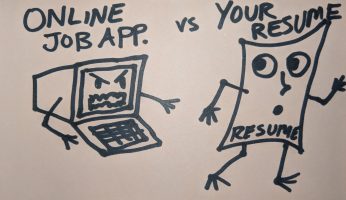November 15, 2017
Guardian of the Gate: Conquering your fear of online job applications
Posted by AGU Career Center

Editor’s note: Graphical depiction of my resume’s reaction to online job applications before reading this article. Art Credit: Nathaniel Janick
Applying for jobs online can feel like throwing your resume into a black hole. You find a job that sounds interesting, enter your information, then wait. And wait. And wait. Most of the time, you never hear anything. Occasionally, you get an automatic “Thanks, but no thanks” email. But every so often you get a preliminary inquiry, to verify your background and interest, which leads to an interview, and eventually a job offer.
The good news is that there are many things you can do to maximize your chances of getting that phone call. It’s really about making it obvious that you have exactly the skills and experience they are looking for – you are the solution to their problem.
First, recognize that when you submit a resume electronically, it almost always goes through an applicant tracking system (ATS) before it’s ever seen by a person. It is crucial that you make sure to follow their instructions exactly, in terms of file formats, information to include or omit, and so on. The system uses an algorithm to compare the words, dates, and phrases in your resume to those specified by the hiring manager.
But you can give yourself an additional advantage by tailoring your resume for each position and company. Start by selecting the most important words from the job description, and use them in your resume – only if they are applicable, of course. For example, if the job description asks for “inter-personal skills”, don’t list your “interpersonal skills”, which is not a match. If the position involves “nondestructive testing” or “NDT” make sure to include both in your document.
In addition to the posted job advertisement, review the organization’s web site, especially their mission statement and look for key words or phrases that you might want to include.
Where you use the words matters as well. Words that are used in sentences, or sentence fragments, get more weight that words in a comma-separated list. Try to work the most important keywords into your accomplishments and headers, and only use a comma-separated list at the end for less relevant skills.
Keep the formatting simple. Use only one font, or at most only a second one for headers. Keep the layout clean and uncluttered. A good check is to save the document as plain text, which is pretty much how the applicant tracking system will see it. Is it clear which dates go with which jobs? Is it easy to skim? If the position requires three years of experience in a particular role, make sure your document makes it clear that you have at least that much.
In the section detailing your professional experience, list accomplishments, not tasks, and work in job titles and other keywords where possible. Words that are repeated multiple places also get more weight, so if appropriate you can repeat the same keywords with a second position.
Some ATS’s will penalize a gap in employment, so be as complete as possible when listing your professional experience. While a short gap or two won’t matter, many gaps or long gaps may be penalized. If you had a non-scientific job, include it, but list transferable skills you acquired there that apply to the position for which you are applying – maybe analyzing historical data or preparing budget projections.
Finally, proofread, proofread, proofread. Then ask someone whose writing skills you respect to proofread again. Competition is fierce, and a single typographical error can be enough to put you out of the running. An editor can also tell you if something is not clear, or point out places where you could include additional information.
In the end, your resume should present a complete picture of your knowledge, skills, and abilities as they relate to the position and organization to which you are applying. Make it easy for both the ATS algorithm, and the person who reads it after that, to see that you are the right fit for the position, and you’ll be on the receiving end of many of those preliminary inquiries – and job offers.
Lisa M. Balbes, PhD, has been a freelance technical writer and editor at Balbes Consultants LLC for over 25 years. She is the author of Nontraditional Careers for Chemists: New Formulas for Chemistry Careers (Oxford University Press).


 On the Job is an AGU blog, that provides career advice and workforce guidance to geoscience students, early-career and established professionals who are interested in pursuing professional enrichment.
On the Job is an AGU blog, that provides career advice and workforce guidance to geoscience students, early-career and established professionals who are interested in pursuing professional enrichment.